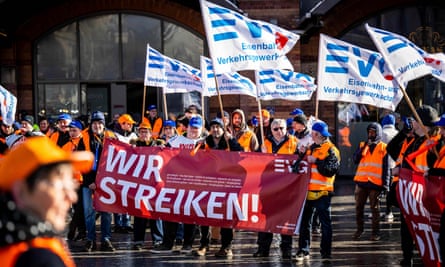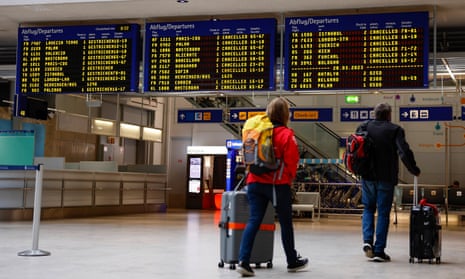German commuters face serious disruption on Monday as transport staff across the country staged a strike to push for wage rises in the face of brisk inflation.
Workers at airports, ports, railways, buses and metro lines throughout much of Europe’s biggest economy heeded a call from the Verdi and EVG unions to take part in the 24-hour stoppage.
“A labour struggle that has no impact is toothless,” the Verdi leader, Frank Werneke, told the public broadcaster Phoenix.
He acknowledged it would inflict pain on many commuters and holidaymakers, “but better one day of strain with the prospect of reaching a wage agreement than weeks of industrial action”.
To prevent supply gaps, the transport minister, Volker Wissing, ordered states to lift restrictions on truck deliveries on Sunday, while asking airports to allow late-night takeoffs and landings “so stranded passengers can reach their destinations”.
Verdi represents about 2.5 million public sector employees, while EVG represents 230,000 workers on the railways and at bus companies.
The rare joint call for a strike in Germany marks an escalation of an increasingly ill-tempered pay dispute that comes at a time of surging inflation. Verdi is demanding a 10.5% rise in monthly salaries and EVG is seeking a 12% rise for its members.
Employers – mostly the state and public sector companies – have so far refused the demands, instead offering a 5% rise with two one-off payments of €1,000 (£880) and €1,500, this year and next.
In anticipation of Monday’s strike, the state-owned rail company Deutsche Bahn (DB) suspended all long-distance trains for the day. Regional and local connections in seven out of Germany’s 16 federal states also came to a standstill.

A DB representative described the nationwide strike as “groundless and unnecessary” and urged the unions to return to the negotiating table “immediately”.
The company expects the strike to have a “massive impact” on its entire rail network and said it would inform its customers “as quickly and comprehensively as possible” about cancellations and delays.
Planes remained grounded at every big German international airport except for Berlin’s Brandenburg airport, where inner-European flights took off with minor delays on Monday morning.
The German airport association said the strike “went beyond any imaginable and justifiable measure”, estimating about 380,000 air travellers would be affected.
The standstill on German railways led to an increase in traffic on roads and motorways, though according to the ADAC, Germany’s roadside assistance association, many commuters had chosen to work from home. “We are not seeing a complete [traffic] breakdown or gigantic chaos,” a spokesperson told the dpa news agency.
Like many other countries, Germany is struggling with high inflation after Russia’s invasion of Ukraine sent food and energy costs soaring.
With inflation hitting 8.7% in February, employers have accused labour representatives of contributing to the problem through their demands for increased wages that they say will feed inflation. Unions dispute this and say their members have been asked to bear the burden of the soaring cost of living.
The “mega-strike”, as local media have called it, follows industrial action in recent months in several German sectors including the postal service, airports and local transport.
As a third round of salary negotiations for public sector workers began on Monday, there were few signs of an imminent solution to the dispute. The VKA, a body representing employers across various public services sectors, said on Monday it was not planning to submit an improved offer to the unions.
Some unions have recently succeeded in winning big pay increases. Postal workers secured average monthly increases of 11.5% earlier in March, and in November IG Metall, Germany’s biggest union, achieved rises totalling 8.5% for almost 4 million employees it represents.
Agence France-Presse contributed to this report
